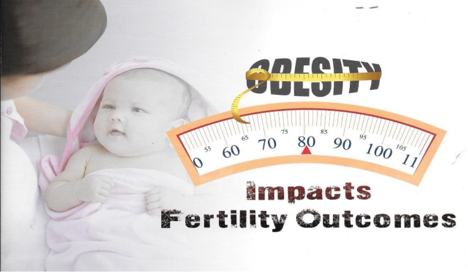Obesity and Infertility

The negative effects of obesity upon Fertility were described by Hippocrates who wrote in his Essay on Scythians ‘People of such constitution cannot be prolific…. fatness and flabbiness are to blame!’
Obesity is a rising epidemic affecting millions worldwide. It is an increasing preventive health burden upon Modern Society. More than 66% of men and 60% of women in the U.A.E. are overweight or obese according to a new analysis.
Obesity is defined by abnormal fat accumulation with body mass index (BMI) > 30kg/m2. Obesity carries an increased risk of Metabolic Syndrome (Abdominal obesity, Diabetes, Hypertension, Dyslipidemia), Cardiovascular Disease, Depression, sleep apnea, and early death.
 In terms of fertility, obesity leads to negative effects in both men and women. Infertility is an important problem caused by obesity. Obesity decreases the rate of successful pregnancy in natural conception cycles. Obesity also leads to disturbing trend of need and failure of Assisted Reproductive Techniques for Conception. Fertility can be partially restored if weight loss is achieved.
In terms of fertility, obesity leads to negative effects in both men and women. Infertility is an important problem caused by obesity. Obesity decreases the rate of successful pregnancy in natural conception cycles. Obesity also leads to disturbing trend of need and failure of Assisted Reproductive Techniques for Conception. Fertility can be partially restored if weight loss is achieved.
Obese women, especially those with central obesity, have been associated with impaired fecundity. Obesity alters the hormonal milieu, impairs ovulation and has detrimental effect on Endometrial Development and Implantation.
Obesity can exert effect on and disturb menstrual cycle and ovulation. Obese women tend to have irregular menses and scanty menses associated with Anovulation.
Obesity is also associated with Polycystic Ovarian Syndrome, along with symptoms of high male hormone secretion like hairiness and acne. Insulin Resistance is linked to Anovulation and infertility in obese women.
Obesity also impairs fertility through an effect upon control of Ovulation, Embryo Development, Endometrial Development and Implantation.
Obese women are more likely to experience pregnancy loss; elevated miscarriages are seen following natural conception, ovulation induction to Assisted Conception in obese women. Miscarriages in obese women are due to poor quality eggs, defective implantation and altered levels of hormones that help in sustaining pregnancy.
Obese women may have reduced Fecundity due to Psychosocial factors causing reduction in sex drive in obese women.
In males, obesity may result in decreased sperm count, no sperm in ejaculate, abnormal motility or morphology. Obesity has also been associated with Testesterone Deficiency in men. Hormonal changes in obesity can cause decreased libido and increased erectile problems.
Successful treatment of obesity includes setting goals and making lifestyle changes, such as eating fewer calories and being physically active. Best way to achieve this is to swap unhealthy food like fast food for healthier choices.
- A healthy diet consists of plenty of fruits and vegetables, whole grains, milk and dairy food, meat, egg, and fish.
- Regular exercise is very important for weight reduction. Fast walking, jogging, swimming, Tennis, and working out at Gym are some excellent means of weight reduction.
- Even loosing 5% of body weight can reduce obesity related infertility and other complications.
- Medicines are only recommended if efforts at diet and exercise have been unsuccessful.
- Weight lost surgery, also called Bariatric surgery, is sometimes recommended to treat people who are severely obese.
The British Fertility Society recommends that ‘Women who are obese must initiate a Weight Reduction Programme and those severely overweight (BMI >36) should not receive fertility treatment until their weight has reduced.’ At Conceive, The Gynaecology and Fertility Hospital, we are very particular about the weight assessment of patients and guide the obese patients carefully to help them loose weight before starting fertility treatment.

About Author:
Dr. Ruma Bhargava Chakraborty
Specialist ‘A’ Gynaecologist and Obstetrician
